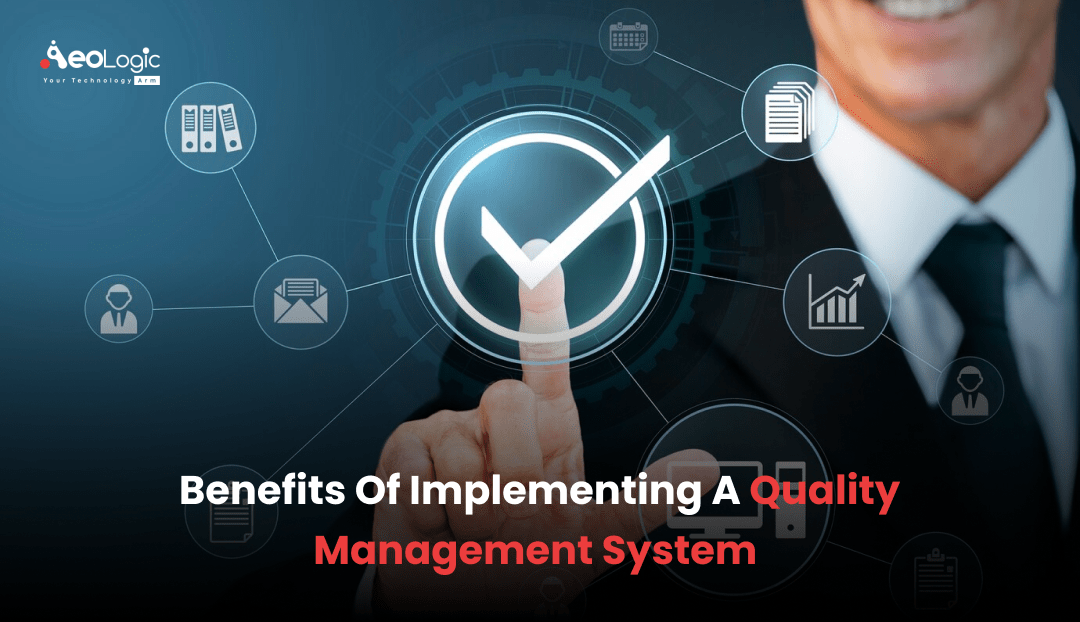Quality Management System (QMS) is necessary in the life sciences business to make sure that services and products are safe, dependable, and up to code.
This article will talk about the different advantages of a Quality Management System (QMS) and how life sciences companies can get ahead by setting up a full QMS. They also use electronic QMS tools to make their processes even more efficient.
We will now examine primary advantages of implementing a quality management system. However, before proceeding, it is imperative to provide a concise explanation of the definition and scope of a quality management system (QMS).
What is a Quality Management System (QMS)?
A Quality Management System (QMS) is an internal system that documents the policies, protocols, and controls required for the development and delivery of high-quality products and services to clients.
When you implement an efficient Quality Management System (QMS), you will be constantly enhancing the quality of the products and services that your life sciences firm markets.
Another significant reason why your life sciences firm should have a QMS is to ensure compliance with applicable regulations. Depending on the industry and type of the products and services provided by your firm, you must have policies and processes in place to ensure that all applicable regulations are fulfilled.
Various standards, rules, and recommendations define the requirements for quality management systems. Some of the main ones are:
ISO 9001:2015 Quality Management System Requirements. Specify the requirements for a quality management system in any firm, regardless of size, nature, or products/services offered.
ISO 13485:2016 Medical Devices – Quality Management Systems – Requirements for Regulatory Compliance. Specify the requirements for a quality management system in which a company must demonstrate its capacity to supply medical devices and related services that consistently fulfill customer and applicable regulatory standards.
US FDA 21 CFR Part 820 – Quality System Regulation. Establishes current good manufacturing practice (cGMP) requirements. The requirements govern the procedures, facilities, and controls used in the design, manufacture, packaging, labeling, storage, installation, and maintenance of medical devices for human use.
ICH Q10 Pharmaceutical Quality System: Scientific Guideline. These principles are meant to be used as a model for an effective quality management system. They are applicable to the creation and manufacture of pharmaceutical drug substances and drug products, including biotechnology and biological goods.
Quality management systems can also take one of three main forms:
- Physical (paper-based) systems
- Hybrid QMS has both physical and software components.
- Fully electronic (software-based). QMS
The fundamental advantage of electronic QMS software over paper-based or hybrid QMS is that it does not require paper. All documentation is electronically saved and accessible from anywhere. This also means that manual operations can be automated, increasing productivity while lowering the danger of human error.
Also Read: The Importance of Document Management System in Modern World
The Aim of a Quality Management System
Recall an instance in which you were dissatisfied with a purchase. It is possible that the item in question was a pen, a mobile phone, or a car. You arrived home to find that the product you purchased was defective. What emotions did that evoke in you?
You may have either contacted the call center to voice your dissatisfaction or simply departed, vowing never to make another purchase from that organization. The objective of a quality management system is to avert the occurrence of product or service-related issues before they reach the consumer.
The quality management system standard, ISO 9001:2015, enables your business to consistently provide products and services that satisfy customer needs and comply with relevant statutory and regulatory requirements. It guarantees that your clients remain content.
7 Benefits of Implementing a Quality Management System in 2024
This deep dive will reveal top critical advantages that businesses can acquire by adopting QMS in 2024. Each benefit intricately contributes to the overarching success and sustainability of an organization, from elevating product and service quality to assuring regulatory compliance, driving operational efficiency, and fortifying brand reputation.
1. Enhanced Regulatory Compliance
The life sciences industry is subject to rigorous regulation due to the direct impact of its products and services on the lives of numerous patients. It is essential that your products and services are safe and effective for their intended purpose.
The organization is anticipated to have a variety of QMS processes in place in accordance with the requirements of the life sciences. The following are a few of the primary quality management system processes that must be implemented, but they are not exhaustive:
Documentation management. Procedures and protocols for the administration and control of documents and records that circulate within and outside your organization should be incorporated into the QMS.
Management of training. It is imperative that the organization maintains personnel who are qualified and proficient in their respective positions. This suggests that training protocols are consistently assessed and training records are accurately maintained.
Management of suppliers. Streamlined protocols for supplier management processes should be implemented in your organization’s QMS. This encompasses the selection, evaluation, approval, and continuous monitoring of suppliers.
Management of audits. A procedure should be established in the QMS to guarantee that internal and external audits are conducted in accordance with the established standards.
Management of CAPA. When there are instances of nonconformances, deviations, audit findings, or customer complaints, corrective and preventive actions (CAPA) may be necessary. It is imperative that all of these actions are meticulously documented, monitored, and managed.
Your organization will have far more control over the quality of its products with the implementation of such comprehensive QMS processes. The organization’s capacity to identify and resolve any potential issues, as well as to comply with relevant regulations, will be enhanced.
2. Improved Customer Satisfaction
Ensuring customer loyalty and contentment are vital for the prosperity of any life sciences firm.
A crucial aspect of managing customer relations is the handling of consumer complaints. The Quality Management System (QMS) should include well-defined norms and procedures for the thorough documentation of client feedback and complaints.
Now, it is necessary to take action based on this information:
Is it necessary to elevate this to a nonconformance? Is it necessary to implement a Corrective and Preventive Action (CAPA) for a specific complaint?
Subsequently, if the Corrective and Preventive Action (CAPA) process is launched and the nonconformance is successfully addressed, the subsequent actions may involve issuing Change Requests, revising the applicable standard operating procedures (SOPs), and providing additional training to the pertinent individuals. By doing so, the firm may effectively prevent the recurrence of similar difficulties, leading to enhanced customer retention and satisfaction.
Organizations can utilize digital Quality Management System (QMS) solutions to access a range of tools that facilitate the documentation and management of client complaints. As an illustration, you have the ability to allocate assignments and dispatch notifications to relevant staff members, connect consumer grievances to nonconformities, elevate them to corrective and preventive actions (CAPAs), monitor the efficacy of remedial measures, and perform numerous other functions, all inside a single platform.
Also Read: Inventory Management Challenges and Solutions for 2024
3. Enhanced Internal Communications
International QMS standards, such as ISO 9001, highlight the importance of internal communications inside a business. The quality management system should be built in such a way that internal interactions take center stage.
According to ISO 9001:2015, clause 7.4 Communication, good internal communications contribute to the success of an organization’s quality management system. In contrast, poor communication is at the root of many QMS issues.
Senior management is responsible for establishing proper communication protocols that allow your staff to share information, provide feedback, and offer constructive criticism. Without this two-way connection, your QMS will simply be a collection of records.
For example, an individual in the quality department may discover a better technique to make a key component. When internal communication channels are open and top management considers comments, the organization may uncover new opportunities, enhance processes, and so ensure the QMS’s success.
Furthermore, the firm may launch various initiatives in which employees would co-author essential documents and protocols, bringing valuable input into decision-making processes.
Once again, best software provider can be extremely useful in facilitating communication with QMS software.
Cloud-based eQMS solutions TO make it easier to access documents and resources, communicate online, share insights, and work efficiently from virtually anywhere.
Furthermore, pre-defined workflows, user access control, visibility into task and activity progress, real-time notifications, co-authoring, and escalation make it simple to track and manage communication across the business.
4. Streamlined Employee Training
The skilled labor is an organization’s most valuable asset. To be successful, any firm must not only attract the greatest people, but also keep it.
One method to accomplish this is to give personnel with appropriate training and assistance.
For example, when the organization is expanding and onboarding new employees, it is critical that they complete a systematic training program and learn the internal processes and standards.
Existing staff must also receive frequent training to maintain their abilities up to date. When adopting new technology, processes, and procedures, the firm must ensure that staff are properly trained and informed on them.
Every part of the training must be thoroughly documented and tracked.
An efficient QMS facilitates this process by documenting all training records, tracking employee development, and monitoring their performance.
Furthermore, you can use QMS software with built-in training management features to automate many of these activities, expediting the employee training management procedure.
5. Scalable Business Growth
Scalability becomes increasingly important as businesses strive for expansion. A quality management system (QMS) establishes a strong foundation for scalable development by guaranteeing that quality remains unaffected as operations expand. A quality management system (QMS) serves as a guiding principle, guaranteeing that each advancement is a step toward sustainable development, regardless of whether it involves an increase in production volume or the expansion of service offerings.
6. Flexibility to Adjust to Changing Business Environments
Adaptability is a critical factor in determining success, as the sole constant in the business world is change. A quality management system (QMS) provides the adaptability necessary to accommodate evolving business environments, including technological advancements, market dynamics, and unanticipated disruptions. Organizations that have implemented a quality management system (QMS) are more capable of navigating uncertainties, thereby ensuring their resilience in the face of change.
7. Market Sustainability and Longevity
Sustainability is not limited to environmental factors; it encompasses the sustainability of a business in the marketplace. A framework for consistent quality, adaptability, and scalability is established by a quality management system, which thereby contributes to long-term sustainability. Organizations that prioritize a quality management system (QMS) are not merely preparing for immediate success; they are also establishing the foundation for long-term relevance in the market.
Also Read: Top Proven Ways to Improve Time Management Skills
Final Words
Organizations can access a robust platform that seamlessly integrates with their processes, facilitates collaboration, and ensures adherence to the highest quality standards by selecting the Aeologic for quality management system. The user-friendly interface fosters a culture of innovation and engagement among employees of all levels.
To learn more about the ways in which Aeologic can be customized to meet your unique requirements and propel your business to new heights, please reach out to Aeologic today and request a custom demo. Our team of experts is prepared to provide guidance and assistance in the establishment of a solid foundation for long-term success in the ever-changing landscape of 2024. Your journey to transformative excellence is ready.

I’m Deepika Pandey, an SEO strategist and content writer with 6+ years of experience. I create SEO-friendly content that drives traffic and engages readers. I combine data insights with creativity to help businesses grow their online presence effectively.







